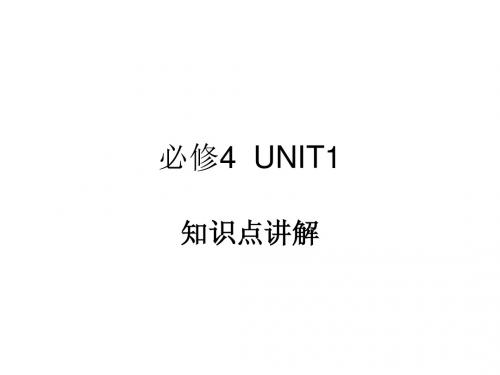高一英语必修四unit1知识点
- 格式:ppt
- 大小:353.00 KB
- 文档页数:35

必修 4 Unitl Women of achievement 知识点讲解1. achieveachieve v.意为完成;达到”指经过长期努力而达到某目标、地位或标准等。
其名词形式为achieveme nt,意为成就;功绩” a sense of achieveme nt 可指成就感"我口:He had fin ally achieved success.Even a small success gives you a sense of achieveme nt.2. con diti oncondition意为环境;境况;条件"时,是可数名词,常用复数形式conditions ;意为状态;状况”寸,是不可数名词,be in good condition 表示处于良好的状态” be out of condition表示健康状况不佳”。
女口:We should pay more atte nti on to the poor livi ng un der the bad con diti ons.The astr on auts soon got used to the con diti on of weightless ness.My car is old but in good con diti on. He is overweight and out of con diti on.condition意为条件"时,常用短语on condition that,表示如果;在.......... 条件下”;在美国英语中,也经常用under the con dition that 。
如:I will come on con diti on that Peter is in vited.They agreed un der the con diti on that the matter be dealt with quickly.3. devotedevote vt.意为投入于;献身”其宾语后常与介词to搭配,to后接名词、代词或动名词。





Unit 1 Women of achievementmon sense 常识;common practice 常规,惯例have- - in common with sb 与・••有共同之处;共同拥有⑴It is a common practice to make an appointment before going to see a doctor in western countries.(2)We are good friends though we have nothing in common.(3)The couple have this house in common.(4)Jack,in common with other boys, is crazy about computer games.(5)What do you think these two scientists have in common?2.concern oneself with 关注;对....... 感兴趣be concerned about/for 担心;忧虑be concerned about/with 对♦・感兴趣;关注be concerned that …担心 /担忧........ as far as sb be concerned 就某人而言concerned adj. 担心的,忧虑的,关心的concerning prep. 关于⑴The president is deeply concerned about this issue.(2)They were more concerned with what other women wore at the meeting.(3)She was concerned that she might miss the turning point and got lost.(4)The old woman concerns herself with the sewing work,paying attention to nothing else around her.(5)She was quite concerned about /for her son ' s safety, so she was not concerned about/with what was happening around her.3.devote …to…致力于;把・•・奉献于•一devote sth to …把・・・用于•一be devoted to 致力于;奉献于;专注于devotion n.挚爱,奉献;热心devoted adj. 挚爱的,忠诚的,全心全意的⑴Chinese woman scientist Tu Youyou devoted herself to discovering artemisinin (青蒿素) ,which has led her tothe Nobel Prize for medicine.(2)I could only devote two hours a day to work on this project.(3)His devotion to his wife and family is touching.(4)You ' d better devote as much time as possible to practicing your spoken English.4.rather than 而不是would - rather than ••• ;would rather …than …;prefer to do - rather than do …(1)I think I will have a cold drink rather than a coffee.(2)Why don ' t you ask for help,rather than trying to do it on your own?(3)You , rather than I,are to blame for the failure of the experiment.(4)I prefer to stay indoors rather than go shopping at weekends.(5)The poor boy would beg from door to door rather than ask his step mother for help.(6)Rather than throw the remaining vegetables away,the farmer would sell them at half price.(7)The father,rather than his children was to answer for the accident.(answer for 对•一负责)5.behave vi. vt. 举动;(举止或行为)表现bahaviour n. 行为;举止;态度behave well/badly be on one' s best behaviour 尽量表现得体behave oneself 表现得体⑴They behaved very badly towards their guests.(2)He behaved as if nothing had happened.(3)We hadn' t thought that the boy behaved so badly at school .6.leave+宾语+宾补使…处于…状态宾补由介词短语,形容词或者分词充当。
、必修4 Unit1 Women of achievement知识点讲解1. achieveachieve v. 意为“完成;达到”,指经过长期努力而达到某目标、地位或标准等。
其名词形式为achievement,意为“成就;功绩”,a sense of achievement可指“成就感”。
如:He had finally achieved success.Even a small success gives you a sense of achievement.2. conditioncondition 意为“环境;境况;条件”时,是可数名词,常用复数形式conditions;意为“状态;状况”时,是不可数名词,be in good condition表示“处于良好的状态”,be out of condition表示“健康状况不佳”。
如:We should pay more attention to the poor living under the bad conditions.The astronauts soon got used to the condition of weightlessness.;My car is old but in good condition. He is overweight and out of condition. condition意为“条件”时,常用短语on condition that,表示“如果;在……条件下”;在美国英语中,也经常用under the condition that。
如:I will come on condition that Peter is invited.They agreed under the condition that the matter be dealt with quickly.3. devotedevote vt. 意为“投入于;献身”,其宾语后常与介词to搭配,to后接名词、代词或动名词。
高一必修四英语unit1 知识点Unit 1: Culture ShockCulture Shock is a common phenomenon that individuals experience when they move to a different country or encounter a culture different from their own. It refers to the feeling of disorientation and confusion that arises due to unfamiliar customs, traditions, language, and social norms. In this article, we will explore the key knowledge points related to Culture Shock in the context of the English curriculum for the first year of high school.1. Definition of Culture ShockCulture Shock is the feeling of discomfort or disorientation that a person experiences when they move to a new cultural environment. It can manifest in various ways, such as anxiety, frustration, homesickness, or even physical symptoms like headaches and insomnia. Culture Shock occurs when individuals are unable to make sense of the new culture they are exposed to, leading to feelings of isolation and confusion.2. Stages of Culture ShockCulture Shock is typically characterized by four stages: the Honeymoon Stage, the Negotiation Stage, the Adjustment Stage, and the Mastery Stage.a) Honeymoon Stage: During this stage, individuals are fascinated by the new culture and everything seems exciting and enjoyable. They are infatuated with the differences and may overlook any negative aspects.b) Negotiation Stage: In this stage, reality sets in, and individuals start to encounter difficulties and challenges. Differences in language, social norms, and daily routines may become overwhelming and cause frustration and homesickness.c) Adjustment Stage: As individuals slowly adapt to the new culture, they begin to feel more comfortable and confident. They develop coping mechanisms and start to understand and accept the cultural differences.d) Mastery Stage: In the final stage of Culture Shock, individuals become fully integrated into the new culture. They are able to navigate the society with ease and feel a sense of belonging.3. Coping Strategies for Culture ShockTo effectively cope with Culture Shock, individuals can employ various strategies:a) Developing Cultural Awareness: Learning about the new culture, its customs, traditions, and values can help individuals understand and appreciate the differences. This can be done through reading, attending cultural events, and interacting with locals.b) Building a Support Network: Connecting with other expatriates or individuals who have experienced Culture Shock can provide a sense of community and support. Sharing experiences and seeking advice from others can greatly help in dealing with the challenges.c) Developing Language Skills: Language often plays a crucial role in adapting to a new culture. Learning the local language or improving language proficiency can enhance communication and ease integration into the society.d) Maintaining a Positive Attitude: Approaching the new culture with an open and positive mindset can make a significant difference inadaptation. Embracing new experiences and being flexible can help individuals navigate the challenges more effectively.4. Cultural Sensitivity and EmpathyCulture Shock is a reminder of the importance of cultural sensitivity and empathy. It is crucial to approach a new culture with an open mind, respect the differences, and avoid making assumptions or judgments. Developing empathy towards the challenges faced by individuals experiencing Culture Shock can foster inclusivity and understanding in multicultural environments.In conclusion, Culture Shock is a natural response to encountering a new culture. It is important to recognize the stages of Culture Shock and employ coping strategies to effectively adapt and integrate into the new cultural environment. By fostering cultural awareness, building a support network, developing language skills, and maintaining a positive attitude, individuals can embrace the experience of living in a different culture and grow both personally and interculturally.。
高一英语必修四unit1知识点总结高一英语必修四 Unit 1 知识点总结Unit 1: Great Scientists本单元主要讲述了一些伟大的科学家及其重要的发现和贡献。
以下是我对本单元的知识点做的总结:一、重点词汇及短语:1. experiment n. 实验2. prove v. 证明3. conduct v. 执行4. method n. 方法5. observe v. 观察6. predict v. 预测7. publish v. 出版8. individual n. 个人9. independent adj. 独立的10. theory n. 理论11. invent v. 发明12. occasion n. 场合13. process n. 过程14. molecule n. 分子15. analysis n. 分析16. infection n. 感染二、重要句型及语法:1. It is said/believed that... 据说/相信...例句:It is said that Thomas Edison conducted thousands of experiments before inventing the electric light bulb.2. In addition to... 除了...之外例句:In addition to his theories on gravity, Isaac Newton also made significant contributions to the field of mathematics.3. Not only...but also... 不仅...而且...例句:Marie Curie was not only the first woman to win a Nobel Prize but also the only person to win a Nobel Prize in two different scientific fields.4. as well as 和...一样,除了...还...例句:Albert Einstein is famous for his theory of relativity as well as his equation E=mc².5. whether...or... 是否...还是...例句:Scientists are still debating whether the universe will continue to expand or eventually contract.三、重要知识点:1. The Scientific Method 科学方法科学方法包括观察、提出假设、进行实验、分析数据、得出结论等步骤。